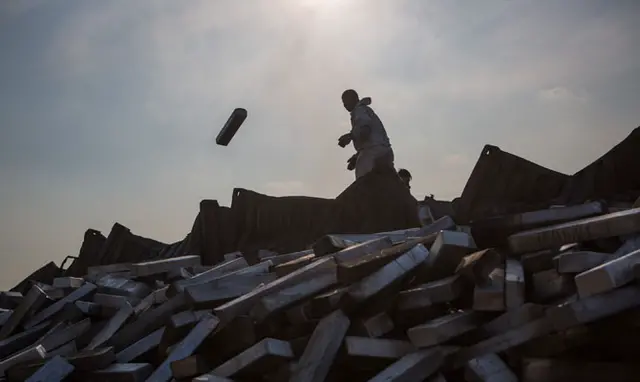Friday the 6th of April marked the end of a state visit by Zimbabwe's President Emmerson Mnangagwa to China. The recently ended trip is Mnangagwa's first state visit to China since taking office in November 2017.
Chinese President Xi Jinping holds a welcome ceremony for his Zimbabwean counterpart Emmerson Mnangagwa before their talks at the Great Hall of the People in Beijing, capital of China, April 3, 2018.[Photo:Xinhua]
Zimbabwe and China's indisputably close relationship dates back to the formal establishment of diplomatic relations in 1980.
With Former President Robert Mugabe having been the principal custodian of this relationship, it remains to be seen how President Emmerson Mnangagwa's administration will work with China to grow this relationship and, in the words of Mnagagwa, establish "some socialism in Zimbabwe with Zimbabwean characteristics".
Still looking East: Zimbabwean Foreign Policy toward China
As early as the year 2000 Zimbabwe had sanctions imposed on it by Western countries and institutions like the World Bank and the IMF. Largely a result of these hostilities, Zimbabwe gradually built strong relationships with alternative development partners in Asia through the adoption of the Look East Policy.
While there is no formal document that has been released by the Zimbabwean Ministry of Foreign Affairs outlining the principles of the Look East Policy, the primacy of this policy is made clear in public pronouncements by government officials and international travel by Zimbabwean diplomats. By developing closer relationships with Asian states including Indonesia, Iran, Pakistan, Malaysia and China, the Zimbabwean government has increasingly prioritised models of economic growth and development that seek to replicate or emulate the experiences of these countries.
At a policy level, there is no indication that the Mnangagwa administration will seek to deviate from the Look East Policy. President Emmerson Mnangagwa is therefore likely to continue to stoke Zimbabwe's relationship with China. This is despite the fact that Mnangagwa is more moderate in his regard toward Western countries and is therefore also likely to begin rebuilding previously tarnished relationships with Western countries.
For Zimbabwe, strategic areas of cooperation with China are geared toward the achievement of goals set out in the Zimbabwean Agenda for Sustainable Socio-Economic Transformation (ZIM-ASSET) 2013-2018, the country's blueprint for social and economic development. With China offering Zimbabwe a "complete package" that includes aid geared toward healthcare and infrastructure development, technical knowledge, money, and clout in the international community through support for decision making in Zimbabwe, there is little doubt that China and Zimbabwe will continue leverage the mutual benefits of their relationship.
A "New Chapter"?
So, what can we expect from this "New Chapter" in Zimbabwe's relations with China? For one, China will continue to provide financial support to Zimbabwe as Zimbabwe seeks deeper economic ties with China. For example, it is reported that a key outcome of the Zimbabwean delegation's trip to Beijing last week included the signing of a $500 million package for the supply of agriculture and mining machinery to Zimbabwe. Mnangagwa and his delegation were also able to secure project funding for the refurbishment of Hwange Power Station’s units 7 and 8, as well as the Robert Mugabe International Airport.
With general elections in Zimbabwe set for July 2018, Mnangagwa's ability to ensure a smooth presidential election certainly presents political uncertainties that China and Chinese actors in Zimbabwe will be factoring into projections for future decision making. The elections will be a defining factor for how the much talked about "new chapter" of Zimbabwe-China relations is realised. Here, it is critical that economic benefits continue to outweigh political risks. From a financial perspective, Zimbabwe's poor record of loan repayment may cause challenges for the country's ability to secure new loans from Chinese institutions.
Zimbabwe still owes US$160 million to China Exim Bank and Sinosure and this has made securing new loans from Sinosure for projects challenging.
Since January 2018 President Mnangagwa has emphasised the "Zimbabwe open for business" sentiment as a call to the international community to invest in the country. While China continued to invest in Zimbabwe over the years, the Mnangagwa administration must ensure that the Zimbabwean economy and business environment remains sufficiently ripe for Chinese investment interests to thrive. Boosting inbound tourism from China to Zimbabwe was also on the agenda during Mnangagwa’s trip. It is reported that the Zimbabwean and Chinese governments agreed that going forward, Chinese nationals will not be required to apply for visas before coming to Zimbabwe. According to a diplomatic source, Chinese nationals will be able to secure visas at the airport.
In an interview with China Global Television Network (CGTN) in Beijing on the 5th of April 2018, Mnangagwa described his trip to China as a "resounding success" and gushed over the "chemistry" that developed between himself and Chinese President Xi Jinping during his trip. From what is known of the outcomes of this trip, there seems to be little that has changed in Zimbabwe’s relations with China. Thus, with attention firmly fixed on Zimbabwe's July election, it remains to be seen how the "all-weather" friendship between China and Zimbabwe will manifest in what remains of 2018.
(CRI)
 简体中文
简体中文

